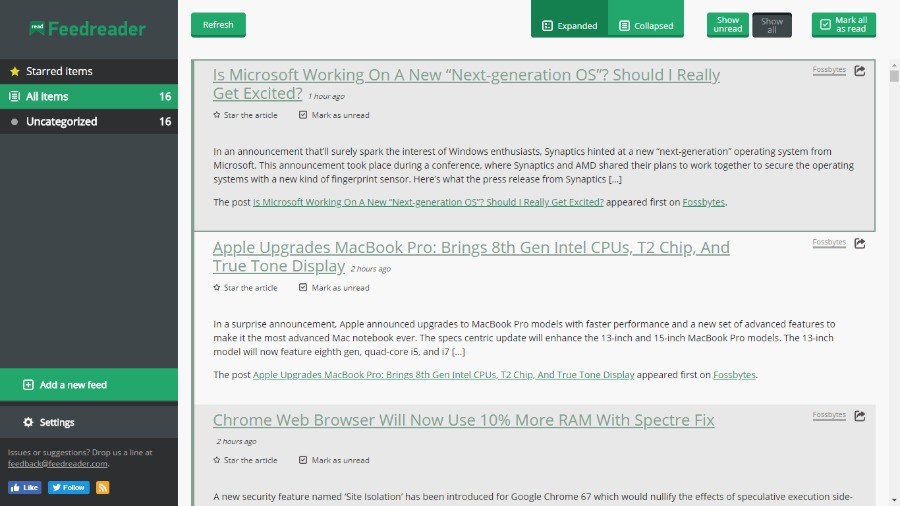

#Best rss reader apps full#
For more details on our process, read the full rundown of how we select apps to feature on the Zapier blog.Īs a tech writer, I rely on my RSS app to keep me up to date on what's going on. We're never paid for placement in our articles from any app or for links to any site-we value the trust readers put in us to offer authentic evaluations of the categories and apps we review. We spend dozens of hours researching and testing apps, using each app as it's intended to be used and evaluating it against the criteria we set for the category. My picks for the best RSS readers are far nicer than Reader ever was.Īll of our best apps roundups are written by humans who've spent much of their careers using, testing, and writing about software. The world of RSS apps has moved on and, a decade later, is actually in a much better place than it likely would have been if Google had remained at the top. While it's still traditional to bemoan the death of Google Reader all the way back in 2013 in any article about RSS, I'll skip the eulogy. You just open your RSS app and get reading, with every article and blog post presented in reverse chronological order.

Still, it remains the absolute best way to combine stuff from loads of different places into one central app, where you can read it without having to click around a bunch of sites or scroll through your social feeds.

Although pretty much every podcast app relies on RSS, it isn't as publicly popular as it used to be. Reeder is not as good, but is comfortable enough for me.RSS (it stands for Really Simple Syndication) has been around since the '90s, and it's a way for sites to publish a feed of all their content in a way that can be easily parsed and aggregated by RSS apps. Sadly, they switched from one-time payment to monthly subscription and I can't justify the cost when I only use it in a very light way(just for sorting items). All the gestures optimized for single-hand operations are just fantastic.
#Best rss reader apps how to#
If I ever need to click a link in an article, jumping from a reader software to a browser is too big of a context switch that disrupts my flow - just let me go through all the feeds right now, and I will decide how to prioritize the most interesting ones and allocate my reading time later.įor my use cases, Unread on iOS gave me the best experience. Ad-blocking - given the current popularity of RSS, I don't know if it really makes sense financially for websites to do so, but I notice some feeds do inject ads. Some personal blog sites have very beautiful (or interesting) designs that I find myself actually enjoys poking around. e.g.: Project release notes on GitHub, which usually come with links to PRs, commits.etc, so I need to open several browser tabs to consume the content anyways.

Some feeds are just better to be read in a web browser. Some feeds only provide title/summary and not the full text article (yes, I know there are full-text extraction service, but last time I tried them, none of them was perfect, and I don't want to play the guessing game - "Am I reading the full article, or a broken extraction?") Instead, I only use a RSS reader software to quickly go through all the unread items and send interesting articles to a read-later or bookmark service. Not sure if it's just me, but I have not used a RSS reader as a serious reading software for years.


 0 kommentar(er)
0 kommentar(er)
